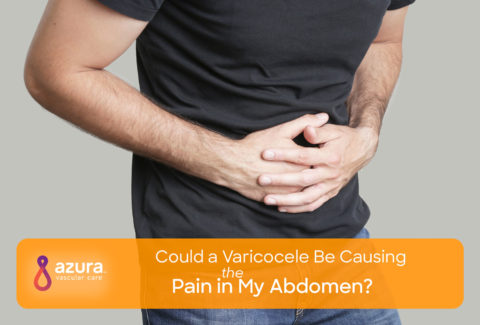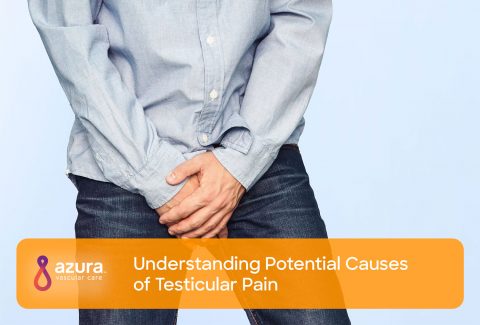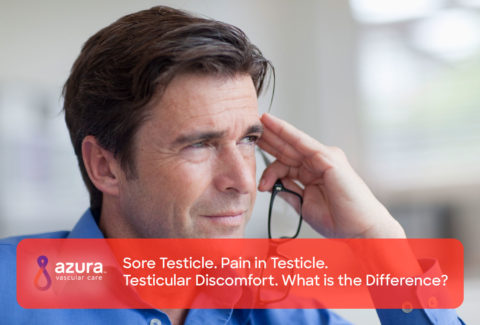
A varicocele often produces no symptoms, but when it does, symptoms may include discomfort, a dull ache, and sharp, severe pain in your groin. (i) Fortunately, there are many ways to achieve varicocele pain relief so you can start feeling better and won’t need to cope with debilitating symptoms that affect your quality of life.
Read on for more information about varicocele, along with three ways you can find pain relief from this common male health condition.
What is a Varicocele?
Varicoceles affect roughly 15% of all men. (ii) A varicocele is a swollen, enlarged vein that develops inside the testicles. A varicocele may not be noticeable at first but can grow over time to appear as a bulge or lump in the affected testicle. (i)
A varicocele develops when valves inside the testicular veins weaken and prevent blood from flowing back toward the heart. Dysfunctional valves can cause blood to pool and flow backward in the veins to cause swelling and widening of the veins. If left untreated, varicoceles can cause pain and may lead to more serious complications like infertility. (i)
What Are the Symptoms of a Varicocele?
A varicocele may not produce any symptoms and a varicocele doesn’t always require treatment. (iii) However, those with varicoceles who experience pain or discomfort may decide to seek treatment so they can relieve pain in the testicle.
Varicocele symptoms may include:
- Aching in the testicle related to prolonged standing or activity (iv)
- Enlarged, twisted veins in the testicle that resemble a bag of worms
- Swelling in the affected testicle, often on the left side
- Noticeable lump or bulge in the affected testicle
- Fertility problems
How Is a Varicocele Diagnosed?
A varicocele may be detected during a routine physical exam, scrotal ultrasound or fertility evaluation. (iii) Your doctor may feel a twisted growth on your testicle or notice that one testicle is larger than the other.
A vascular specialist may be able to feel the varicocele if it’s become swollen or enlarged. If the varicocele cannot be visibly detected, your doctor may ask you to stand up, take a deep breath, and hold it while you bear down. This is also known as a Valsalva maneuver and may help your vascular specialist to detect abnormally large veins in the testicles. (v)
A scrotal ultrasound uses high-frequency sound waves to give your vascular specialist a clear view of the inside of your groin and testicles. This test helps to rule out other underlying health conditions that may be causing your varicocele symptoms. (v) For instance, if you are also experiencing lower back pain with testicular pain, your doctor may refer you to a specialist to screen for testicular cancer. (vi)
What Are Possible Varicocele Complications?
The most serious complications associated with varicocele are: (i)
- Infertility
- Reduced sperm count
- Atrophy or testicular shrinkage
Varicocele Pain Treatment Options
- Surgery
- Embolization
- Pain Medicine and Athletic support
There are several treatment options that can help you find varicocele pain relief. Most of these treatments are available at an outpatient vascular center.
1. Surgery
Varicocelectomy is the surgical procedure to repair a varicocele. During a varicocelectomy, the surgeon makes an incision in your lower abdomen and ties off the affected vein to direct blood flow to other veins. (i) This varicocele treatment requires general anesthesia and results in downtime that lasts an average of two weeks. (v)
2. Embolization
Varicocele embolization is a minimally invasive outpatient procedure that is just as effective as surgery but results in less recovery time and fewer complications. During embolization, a vascular specialist places a small, hollow catheter into your groin. A tiny coil is then passed through the catheter into the varicocele to block blood flow to the affected vein and redirect blood flow to normal veins. (i)
Varicocele embolization recovery time usually takes about two days and is considered the least invasive treatment for a varicocele. (ii) Embolization does not require surgical incisions and can be effectively and safely performed under local anesthesia.
3. Pain Medicine and Athletic Support
Over-the-counter pain relief medicines can help relieve minor discomfort associated with a varicocele. If a varicocele isn’t affecting your fertility and only causes minor pain, try using acetaminophen and ibuprofen to relieve your symptoms. (v)
You may also try wearing undergarments that support your testicles and that help relieve pressure. Snug-fitting brief-style underwear and an athletic support or jockstrap may be effective at helping you experience varicocele pain relief. (v)
Finding Varicocele Pain Relief
If you have been diagnosed with varicocele and feel pain in your groin or testicle that won’t go away, contact a vascular specialist immediately. A vascular specialist can discuss your treatment options to help you find varicocele pain relief.
Sources:
(i) Medline Plus. (2017, August 26). Varicocele. Retrieved February 28, 2019, from https://medlineplus.gov/ency/article/001284.htm.
(ii) Halpern, J., Mittal, S., Pereira, K., Bhatia, S., & Ramasamy, R. (2015, December 8). Percutaneous embolization of varicocele: Technique, indications, relative contraindications, and complications. Asian Journal of Andrology, 18(2), 234–238.
(iii) Mayo Clinic. (2017, December 27). Varicocele: Symptoms & causes. Retrieved February 28, 2019, from https://www.mayoclinic.org/diseases-conditions/varicocele/symptoms-causes/syc-20378771.
(iv) Johns Hopkins Medicine. (n.d.). Varicocele. Retrieved February 28, 2019, from https://www.hopkinsmedicine.org/healthlibrary/conditions/kidney_and_urinary_system_disorders/varicocele_22,Varicocele.
(v) Mayo Clinic. (2017, December 27). Varicocele: Diagnosis & treatment. Retrieved February 28, 2019, from https://www.mayoclinic.org/diseases-conditions/varicocele/diagnosis-treatment/drc-20378772.
(vi) American Cancer Society. (2018, May 17). Signs and symptoms of testicular cancer. Retrieved February 28, 2019, from https://www.cancer.org/cancer/testicular-cancer/detection-diagnosis-staging/signs-and-symptoms.html.
(vii) Chiba, K., & Fujisawa, M. (2016, August 23). Clinical outcomes of varicocele repair in infertile men: A review. The World Journal of Men’s Health, 34(2), 101–109.


